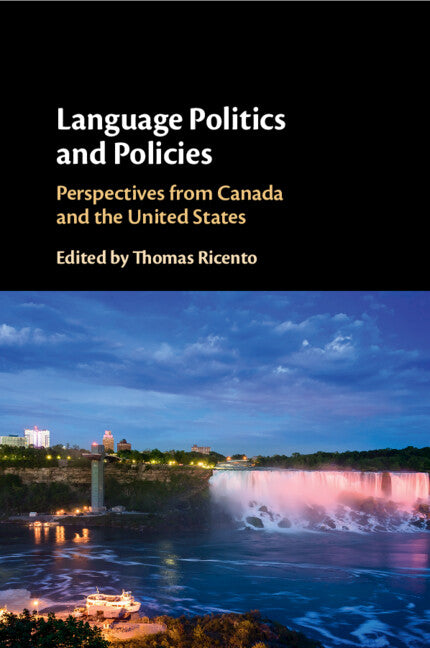Freshly Printed - allow 6 days lead
Couldn't load pickup availability
Language Politics and Policies
Perspectives from Canada and the United States
Leading scholars in language policy examine the politics and policies of language in Canada and the United States.
Thomas Ricento (Edited by)
9781108453141, Cambridge University Press
Paperback / softback, published 9 June 2022
350 pages
22.8 x 15.2 x 1.9 cm, 0.515 kg
'A must for language mavens and policymakers alike, Language Politics and Policies provides concise, balanced and well-informed studies of the current state and future prospects of English, Spanish, French, Indigenous languages and immigrant languages in Canada and the United States. The insights offered by its comparative perspective are enlightening and sometimes surprising.' Stephen Henighan, University of Guelph, Canada
Tensions and conflicts related to linguistic identity and security are inevitable - even necessary - in liberal democracies. However, if conflicts related to language and identity negatively impact democratic participation, and lead to social fragmentation, civic withdrawal, and lack of trust in societal institutions, then the political system itself may become suspect and unstable. Written by experts from the fields of sociolinguistics, bilingual studies, political science/philosophy, and education, this volume provides a comprehensive picture of the current political, cultural and social factors impacting language policy in the United States and Canada. The chapters cover many aspects of social life in North America, such as immigration, bilingual education, heritage languages, and linguistic identity, and explore the challenges and set-backs, along with the many positive steps taken in recent years to advance the values of inclusion amidst diversity in a variety of contexts and domains in the United States and Canada.
Part I. Theoretical Orientations: 1. The liberal tradition in America: a historical-institutionalist approach to US language policy Selma K. Sonntag
2. The political ethics of linguistic in-betweenness Yael Peled
3. Alienation, language work, and the so-called commodification of language John Petrovic
4. Putting Canadian language politics in a global context Peter Ives
Part II. The USA Context: 5. Disciplining bilingual education Nelson Flores
6. Measuring multilingualism in Canada and the US: ideology, policy and census language questions Jennifer Leeman
7. The rise, fall, and rebirth of bilingual education in US educational policy and the new American dilemma Terrence G. Wiley
8. Language policy conflicts: New York City's efforts to expand bilingual education amidst English-only assimilationist pressures Kate Menken and Sharon Avni
9. Indigenous language reclamation – cautionary tale and necessary intervention in raciolinguistic inequality Teresa L. McCarty
10. The politics of language education policy development and implementation: Minnesota (not so) nice? Kendall King and Martha Bigelow
Part III. The Canadian Context: 11. Heritage language education policies and the regulation of racial and linguistic difference in Ontario Jeff Bale
12. A Foucauldian approach to language policy in Canada Eve Haque
13. Promises, acts, and action: Indigenous language politics in Canada Donna Patrick
14. Language, land, and stewardship: Indigenous imperatives and Canadian policies Mark Fettes
15. A land of immigration and official French-English bilingualism: politics and policies for integration of adult immigrants into French-Canadian minority communities Monika Jezak
16. Ethnocultural and linguistic diversity: new challenges to Canada's language regime Linda Cardinal and Rémi Léger.
Subject Areas: Historical & comparative linguistics [CFF], Language acquisition [CFDC], Psycholinguistics [CFD], Sociolinguistics [CFB], Language: history & general works [CBX]


